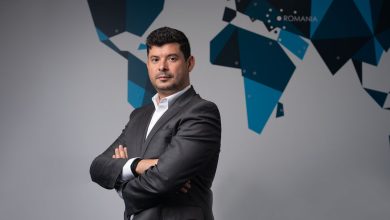Mihai Popa, attorney at law: The new tax framework in the oil & gas sector
His views on the new tax framework in the oil & gas sector and the special legal provisions for exploration operations Serbaniuc & Popa is a law firm which provides tailored legal services for litigation, arbitration, legal advisory and regulatory on oil & gas law, corporate, taxation, commercial, public procurement, employment, real estate and insolvency matters. Mr. Mihai Popa, Founding Partner with Serbaniuc & Popa, shared us his views on the new tax regime in the oil and gas sector, the special legal provisions that should be drafted and implemented for exploration operations, and the company’s plans for the future.
How does your business card look like and how have you gained professional experience?
Mihai Popa: A lawyer is usually accustomed to talk about others, not about self matters. So, this interview would be an interesting exercise for me. I am a counsellor registered with Prahova Bar Association and the Romanian National Bars Association. I’m practicing law for more than 12 years. In 2006, following several years of work as a member of a reputable litigation team mainly on corporate, commercial and privatisation lawsuits, an interesting professional challenge came along for me, respectively the challenge to initiate a boutique law firm. This is how MPCA Attorneys at Law has been founded. Since its start-up, MPCA has been focused on tailored legal services by a small team of young, passionate and enthusiastic lawyers, in corporate, commercial, privatisation and reorganisation legal matters. We were doing mainly litigation, but we continuously developed a legal advisory practice to balance the business. As the business developed we extended to insolvency, taxation and public procurement, according to our clients’ needs. For some time, we were also focused on real estate during the real estate bubble, as we have handled several interesting development projects.
MPCA’s first approach in the oil & gas sector was not related to upstream, but to the downstream, as we advised a very large Romanian engineering company in several projects. The reasonable question is, of course, why oil & gas and not agriculture, for example? This answer is so simple: because we have our headquarters in Ploiesti, Romanian’s biggest oil & gas hub, so we just could not stand aside.
We progressively extended our niche practice by focussing mainly on onshore upstream operations, while servicing our clients’ needs as a ‘one stop shop’ law firm for E&P. Our practice covers any kind of public procurement awarding proceedings for onshore drilling & workover projects, legal advice during the implementation of any onshore drilling & workover, well related services contracts, drilling and/or well related services framework agreements, equipment acquisition, business development for upstream operations in North Africa & Middle East countries, geothermal drilling projects and, last but not least, it covers the high potential risks technical accidents disputes related to drilling and well related services.
Serbaniuc & Popa is a newly born law partnership that acted initially as a consortium to jointly provide scientific research on legal matters related to oil & gas law in partnership with the Oil & Gas University of Ploiesti. We teamed up for several projects, ascertained our compatibility and common values and thus decided to merge in order to be able to provide higher quality for our clients. I should point out that my partners Mrs. Mirela Serbaniuc and Mr. Liviu Serbaniuc are very prodigious litigators, having more than 30 years of professional background and experience. Our vast litigation experience is the key of our proficiency in legal advisory, because we have a wide know-how of what should be secured in a project, in our clients’ benefit.
Serbaniuc & Popa aim to provide high quality legal services within long term partnerships with the clients of its portfolio. We are focused on permanent quality enhancement for the benefit of our clients. Therefore our motto is ‘Synergy & Performance’.
What is the range of services you offer to customers?
Mihai Popa: We provide a wide range of services, respectively litigation and arbitration, regulatory and legal business advisory. Our area of expertise includes corporate law, commercial, taxation, public procurement, reorganisation, real estate, insolvency, labour and, last but not least, oil & gas law.
You’re probably the youngest member of the Board of Directors of the company Dafora Medias. What made you join the energy field, specifically the oil and gas sector?
Mihai Popa: I am definitely the youngest member of Dafora’s Board of Directors. Due to corporate governance rules I have been appointed non-executive member of the Board by the General Assembly of Stockholders, as of 2012. Non-executive Board experience is an outstanding professional challenge and an opportunity to continuously enhance my specific knowledge for this sector, as I was in touch along with highly trained and experienced oil & gas engineers and managers in Romania.
How is the oil and gas market seen in Romania through the eyes of the lawyer Mihai Popa? How do you assess the recent developments in the field, under the imprint of decline in oil prices, and how do you see, on short and medium term, the industry’s recovery?
Mihai Popa: This is a very hard question. In a global economy, Romania’s oil & gas market is 100% dependent on the global factors as well as the developments coming on the global financial and commodities markets. I would dare suggesting the attempt to forecast a trend or an evolution on the markets, in general, should be minimised as much as possible, because nobody can predict the markets. I do believe that it would be healthier for any company involved in the oil & gas sector to draw up its strategy aside from making predictions about the ongoing trends. So, companies shouldn’t predict how low the crude oil prices would go, or how long the crises would last, or when the E&P operations would come back to what it used to be called the normal standard. Should we be listening to rumours, particularly from the OPEC, the ‘normal standard’ may never come back again. I believe the companies should just draw up strategies to cover alternative scenarios, to adapt to the resources on the short term without jeopardizing the development on the mid and long term. Without taking into account the geopolitical risks, which may brutally influence markets in general, I do believe that in terms of crude oil prices the current market conditions are to stay for the coming couple of years, at least. The factors are multiple, I would just mention few of them, which I do consider as the major ones, such as the eighty years record high stockpiles in the US, the growing output from OPEC countries, the OPEC Gulf countries’ increasing refining capacities, the rising value the USD subsequent the end of the last QE programme and the rate hike expectations. On top of that, should a positive resolution come regarding the UN sanctions against Iran, Tehran that could boost outbound shipments by as much as 1 million bpd. All in all, fundamentals are set for even lower crude oil prices in 2015. Of course, we cannot rule out short term counter trends, but I would consider any uprising move is just bringing consolidation on the long term, as doesn’t have the potential to change the main trend, yet. So bearishness will dominate this market.
Anyway, any particular crisis brings along its own opportunities. Besides the fact that low energy prices have the potential to boost consumption to create growth, for the industry players there are some specific opportunities such as lower equipment prices and services, as well as better payment conditions, prudential resources consumption, as well as a new wave of M&A to consolidate the business. The most eloquent example in that respect is the acquisition of Baker Hughes by Halliburton. On top of that companies should try to diversify their operations. If you compare market valuations between drillers and well related services suppliers you would quickly understand why the latters suffered less.
The new tax regime in the oil and gas sector is a hot issue in the negotiations between the government and companies. From the standpoint of President Klaus Iohannis, the legal framework should be amended so that part of the royalties to the state budget should be directed towards local communities and even to landowners, as in the US. What is your opinion on this topic? Are you a supporter of any European model?
Mihai Popa: We have two kinds of issues regarding this topic. One is the value of the royalties and the second is the beneficiary/beneficiaries of the funds.
As far as I know, according to a recent Deloitte research, the royalties and taxes in Romania for oil & gas sector are standing at 13.9 % of the operational revenues generated by the E&P operations, which is more than the European average of 12.2% and almost double than the 6.9% average for the low productivity states (less than 40 bpd/well), similar to Romania’s level. Should we keep this level, we might have to face serious investment barriers to any new FDI in oil & gas, moreover in the current market conditions. Whereas the trends and developments in the commodities markets, all the actors involved in this process from a constitutional perspective should priorly make a deep analysis before decide the new tax regime, looking for a business friendly environment to create growth, jobs and more taxation revenues, which doesn’t necessarily mean higher taxes and royalties.
Regarding the second issue of this topic, I do agree with the point of view expressed by the President, taking into account that the state is already benefiting by collecting revenues mainly from corporate and employment taxation. So, the royalties, in whole or in part, may easily go to the local communities for regional development projects only, with the main aim to create jobs and infrastructure for the local communities.
The draft national energy strategy for 2015 – 2035 points to a number of barriers to investments, including to the instability of the regulatory framework in the energy sector and tax system. What is your approach regarding these issues?
Mihai Popa: As I have already emphasized, regarding taxation, it is mandatory to design and to fully implement a predictable and stable tax system for all economic areas in order to attract FDI in general. Moreover, this should be applicable to oil & gas, especially in the current market conditions, when any taxation barrier is meant to increase the burden of production costs, thus would be instantly rejected by the investors. In other words, it’s better to have less from something which has the potential to grow instead of trying to get more of something small or maybe not existent.
Besides the taxation issues, regarding the energy law framework, I do confirm that an important obstacle to the further developments in the industry is the current petroleum law and the legal framework in force related to it, that should be updated to the new API, IADC standards. For instance, as E&P is a risky venture, I believe the new petroleum laws should contain accurate legal provisions about the rights and obligations under specific contracts for E&P operations, as well as an accurate partition of risks between operators, drilling contractors and well related services suppliers. In addition, I would dare say that special legal provisions should be designed for exploration operations which should fall under a different standard, notwithstanding the contracts are awarded upon a public or non public procedure.
For example, daily rates should be applicable in any circumstances for exploratory operations in case of technical accidents which are not related with any kind of contractors’ fault, such as kicks, lost of circulation, stuck pipes and changes of the geo-technic conditions within encountered formations, and their subsequent effects.
In order to comply with the EU environment requirements, the companies in the oil and gas sector are facing major challenges. Do you provide legal advice in this field?
Mihai Popa: Of course! Well, not on a standalone basis, but as a part of our oil & gas practice because environmental matters are top priorities for any oil & gas company, either for operators, or for drilling contractors and/or for well related service suppliers.
What projects do you have in view for the next period? Do you intend to expand your business to other areas?
Mihai Popa: Our main focus on the short term is to increase the synergy and performance among the members of our team. Due to the current economic trends, in the coming future Serbaniuc & Popa intends to consolidate its practice mainly regarding taxation, reorganisation, oil & gas, public procurement and employment.
Our biggest professional challenge on the midterm is to extend our oil & gas niche practice to the offshore operations.
Would you name the main reasons why customers turn to your services and the core values by which you run your business.
Mihai Popa: I think this happens due to our professional commitment, as well as due to the outcome of our work. The main values of our firm stand in our motto. We try to create synergy in order to enhance the performance we aim to deliver to our clients.







